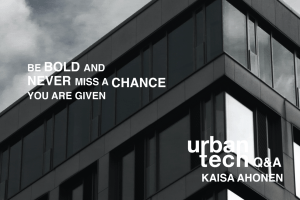Emilie is the Deputy Director of Global Initiatives and Climate Partnership at C40 – a network of the world’s megacities committed to addressing climate change. C40 supports cities to collaborate effectively, share knowledge, and drive meaningful, measurable, and sustainable action on climate change.
Prior to joining C40, Emilie worked on cities and climate action in the City of Copenhagen, Danish Ministries, and in the Danish green think tank Monday Morning.
Urbantech: Tell us about the objectives of your work.

Emilie Hvidtfeldt
Emilie: C40 is based on a network of cities with the central idea being that many of these cities share the same challenges and opportunities when it comes to climate change. Our focus is international because Copenhagen will probably learn more from Stockholm than it will from Aarhus when it comes to climate adaptation. We’re trying to change perceptions of what cities can do and what we can achieve when we put the mayor in the middle. Cities are where people live, work, and where the majority of economic development happens – and by proxy where a large percentage of emissions come from.
Urbantech: What do you consider as the most pressing issues to address? And why?
Emilie: Cities have many challenges when it comes to climate change, both from a mitigation and adaptation point of view. Transportation, buildings, and waste represent the biggest areas of emissions. We’re working hard on setting the standards for building codes and getting the price down on low emission building materials. The reality is that there’s a huge market, but we need to drive the demand to effect change faster Oslo is one of our lead innovator cities in this domain through their focus on clean construction, materials, and embedded carbon. There’s also a lot of work to be done in driving down energy usage and demand in buildings.
Urbantech: Tell us about the changes you see happening in the sustainability field.
Emilie: Sustainability has so far had a fairly narrow focus on climate, but this is changing – not least due to the effects of COVID-19. The narrative is becoming much broader in scope. Environmental sustainability initiatives have been traditionally implemented into technical departments, but the consequences have not necessarily been far-reaching. As a result of COVID-19, there has been a focus on the relationship between health and climate with air quality being just one example of one of those topics coming to the forefront.
In Milan, we’ve seen a huge number of bike lanes introduced overnight so people can travel around the city safely in times of pandemic. This is of course an immediate result of COVID-19 but nonetheless has significant impacts in terms of environmental sustainability. To me, this is a very Nordic version of sustainability where the focus is on creating healthy and liveable cities. One trend we see that has really picked up is the 15-minute city – which makes this idea very concrete.
Urbantech: How does Copenhagen compare to other cities from a sustainability perspective?
Emilie: Cities like Copenhagen generally have the same challenges that the bigger cities do – just on a smaller scale. Right now, Copenhagen is being spoken about as a test lab and a place to try out new climate solutions. Accommodating that level of experimentation is something that the smaller cities can do and many look to us for that reason. But we also have to pay attention to consumption-based data. When we do Copenhagen goes from number one to on the same level as cities like Dubai – which don’t have strong sustainability profiles.
Urbantech: What would you like to hear more – or less – of in future discussions?
Emilie: Inclusion and equity should be big on the political agenda of post-COVID recovery in cities. Movements like Black Lives Matter obviously gained huge momentum this year – and it is exactly this inclusion aspect that is often missing from discussions. Climate justice has really come to the forefront this year as many vulnerable people living in dense neighbourhoods with poor living conditions have been disproportionately affected by the virus. This brings ideas of climate adaptation and mitigation into a much wider perspective. Adaptation should also be 50% of what we talk about when it comes to climate change. The storms and the wildfires are here – now is the time to do something about it. We have the knowledge – it’s just very challenging to get politicians to commit to it.
___________________
Connect with Emilie on LinkedIn
Interview by Freya Williams




